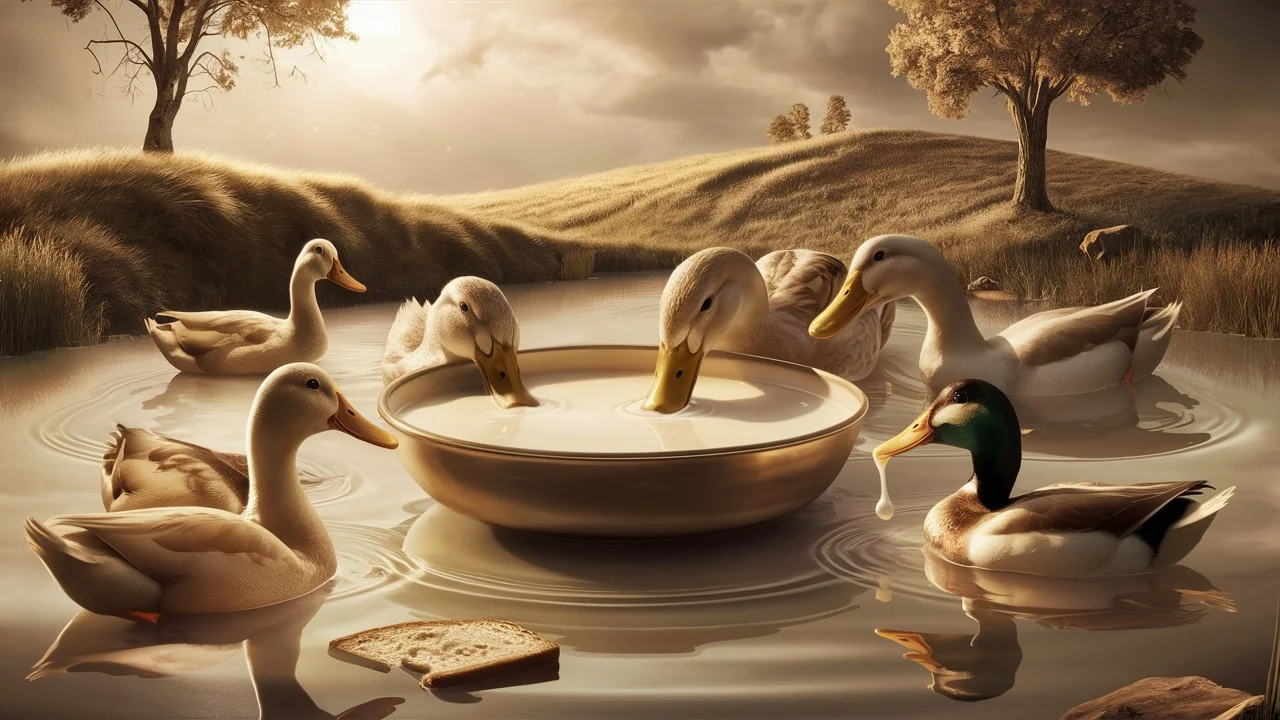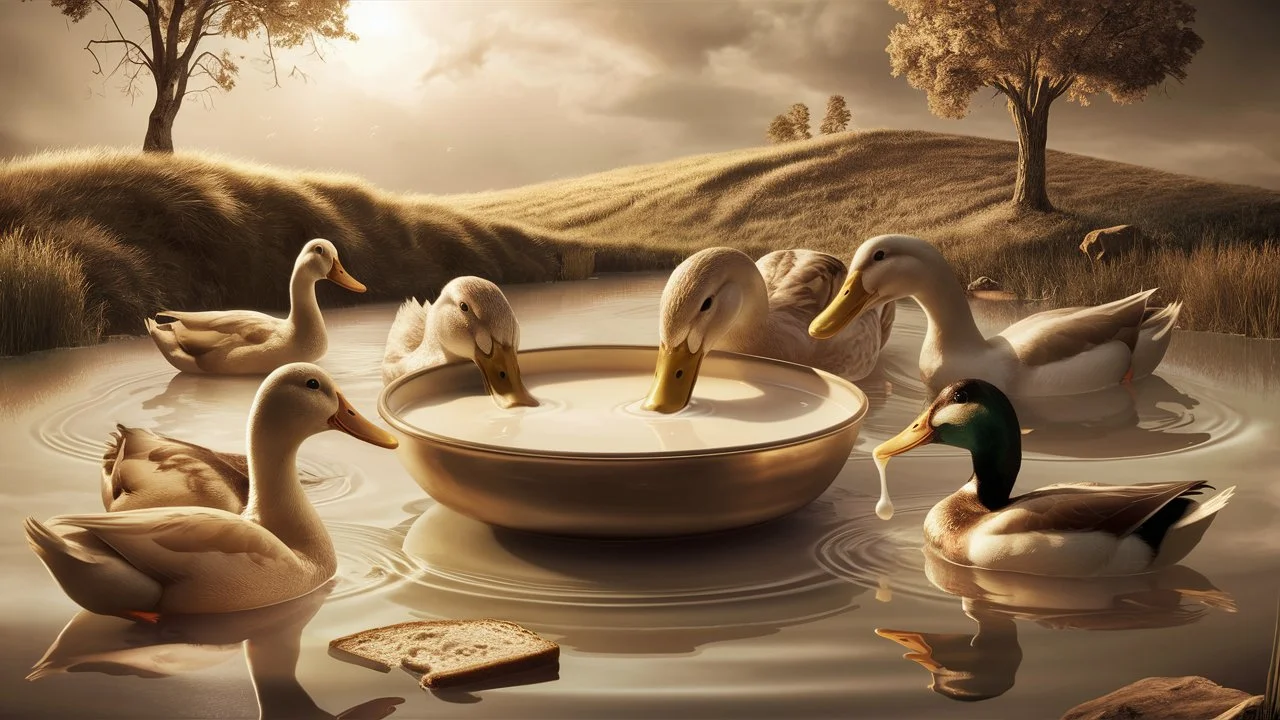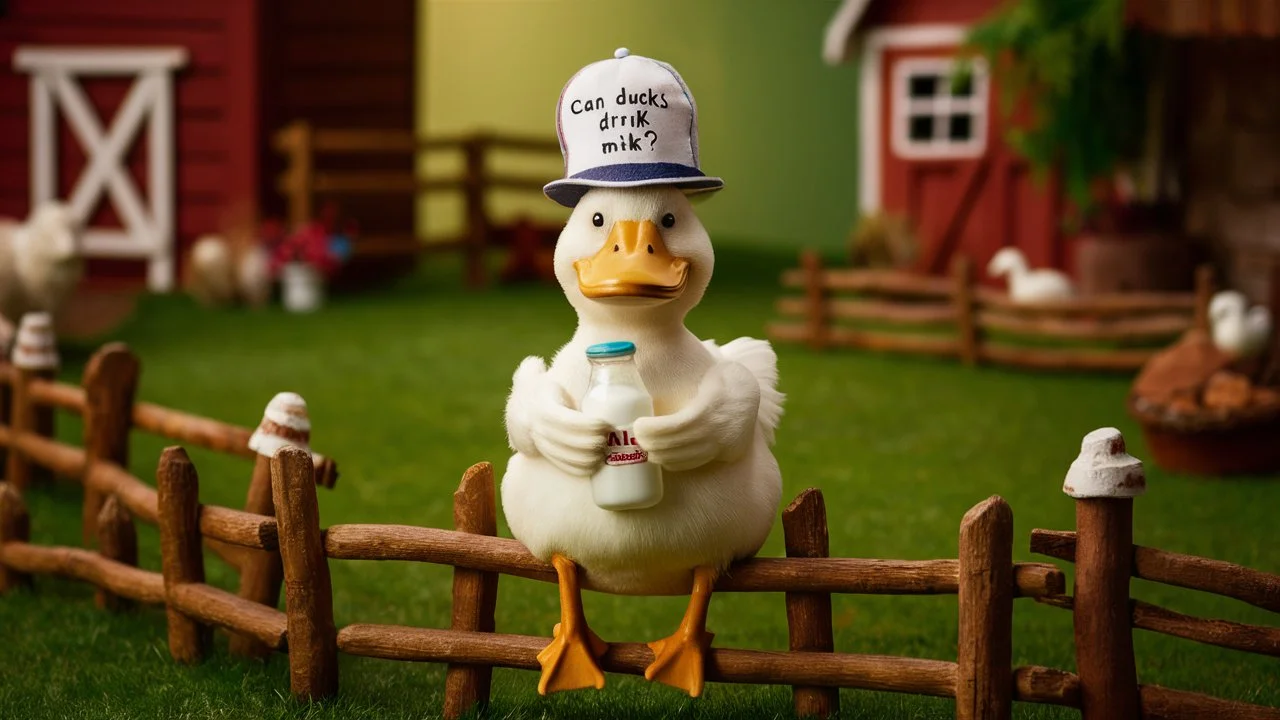Feeding ducks can be a delightful and rewarding experience, allowing people to connect with nature and enjoy the presence of these charming birds. However, it’s crucial to understand what foods are safe and beneficial for them. While ducks are known for their varied diet that includes grains, seeds, and insects, certain foods, like milk, are not suitable and can even be harmful. Ducks are not equipped to digest milk, and offering it to them can lead to serious health problems.
In this comprehensive guide, we will dive into why ducks should not drink milk, the consequences of feeding them dairy, and provide essential information on what makes up a healthy and nutritious diet for ducks. Ensuring you feed ducks correctly is key to their health and well-being, helping them thrive in their natural habitat.
Can Ducks Drink Milk?
Feeding ducks can be a delightful activity, but it’s crucial to understand what foods are safe and nutritious for them. While ducks are adaptable and can consume a variety of foods, dairy products like milk are not suitable for their diet. This comprehensive guide explores why ducks should not drink milk, what happens if they do, and what constitutes a healthy diet for these waterfowl.
Related reading:Can Ducks Eat Chicken Feed?

Understanding Duck Physiology
Lactose Intolerance in Birds
- Lactose: Lactose is the primary sugar found in milk. To digest lactose, an enzyme called lactase is required.
- Bird Digestive Systems: Birds, including ducks, do not produce lactase. This means they are lactose intolerant and cannot properly digest milk.
Digestive Issues from Milk
- Diarrhea and Dehydration: When ducks consume milk, the lactose remains undigested in their intestines. This can lead to diarrhea, which can cause dehydration.
- Nutrient Absorption: Digestive distress from lactose can impair the absorption of other essential nutrients, leading to further health issues.
Nutritional Needs of Ducks
Ducks require a balanced diet that provides all the essential nutrients for their growth, health, and reproduction. Here’s what a healthy duck diet includes:
Protein
- Sources: Insects, small fish, worms, and commercial poultry feed.
- Importance: Protein is vital for muscle development, feather growth, and overall health.
Carbohydrates
- Sources: Grains such as corn, wheat, barley, and oats.
- Importance: Carbohydrates provide energy for daily activities and metabolic functions.
Fats
- Sources: Seeds and certain insects.
- Importance: Fats are necessary for energy storage and maintaining healthy skin and feathers.
Vitamins and Minerals
- Sources: Leafy greens, vegetables, and commercial duck pellets.
- Importance: Vitamins and minerals support various bodily functions, including bone health, immune function, and reproductive health.
Why Milk is Not Suitable for Ducks
Lack of Nutritional Value
- Inappropriate Nutrient Profile: Milk does not provide the specific nutrients that ducks need. While it is nutritious for mammals, it is not formulated for avian diets.
- Better Alternatives: Ducks should receive their calcium from leafy greens and formulated feed, not from dairy products.
Potential Health Risks
- Digestive Upset: As previously mentioned, lactose intolerance in ducks can lead to diarrhea and dehydration.
- Long-term Effects: Regular consumption of inappropriate foods like milk can lead to malnutrition and weakened health over time.
Appropriate Diet for Ducks
Commercial Duck Feed
- Formulated Pellets: These are specially designed to meet the nutritional needs of ducks. They contain the right balance of protein, vitamins, and minerals.
- Starter, Grower, and Layer Feeds: Different formulations are available depending on the duck’s life stage.
Grains and Seeds
- Types: Corn, wheat, barley, oats, and sunflower seeds.
- Benefits: Provide essential carbohydrates and fats for energy.
Vegetables and Greens
- Types: Leafy greens (such as spinach, kale, and lettuce), peas, corn, and chopped vegetables.
- Benefits: Offer vitamins, minerals, and fiber.
Protein Sources
- Natural: Insects, small fish, and worms.
- Supplemental: Commercial poultry feed can also provide necessary protein.
Water
- Essential Hydration: Ducks need constant access to clean, fresh water. Water is critical not only for drinking but also for helping ducks digest their food properly.
Feeding Tips for Ducks
- Balanced Diet: Ensure that ducks receive a varied and balanced diet that meets all their nutritional needs.
- Avoid Human Food Scraps: While it can be tempting to feed ducks leftovers, many human foods are not suitable for them and can cause health issues.
- Monitor Health: Regularly check the ducks for signs of health issues such as lethargy, changes in eating habits, or digestive problems.
- Seasonal Adjustments: Adjust the diet according to the season. For example, in winter, ducks may need more energy-rich foods to help them stay warm.
- Foraging Opportunities: Allow ducks to forage naturally as much as possible. Foraging helps them get exercise and find natural food sources.
What to Avoid Feeding Ducks
- Bread and Crackers: These foods are often given to ducks but are not nutritious and can lead to obesity and malnutrition.
- Salty Foods: Ducks should not consume foods high in salt as it can lead to dehydration and kidney problems.
- Sugary Foods: Foods high in sugar can cause digestive upset and long-term health issues.
- Processed Foods: Avoid feeding ducks any processed human foods, which can contain harmful additives and preservatives.
Common Myths About Duck Feeding
Myth: Ducks Can Eat Anything
- Reality: While ducks are omnivorous and adaptable, not all foods are safe or nutritious for them. It’s important to provide a diet that meets their specific needs.
Myth: Bread is a Good Food for Ducks
- Reality: Bread offers little nutritional value and can lead to health issues like angel wing, a deformity caused by poor nutrition.
Myth: Ducks Don’t Need Water When Eating Dry Food
- Reality: Water is essential for ducks, especially when consuming dry food. It aids in digestion and prevents choking.
Are there any benefits to milk for ducks?
No, there are no benefits to giving milk to ducks. Ducks are lactose intolerant and cannot digest milk properly. Feeding milk to ducks can cause several problems, such as:
- Digestive Issues: Milk can cause diarrhea and upset their digestive system because they lack the enzyme lactase needed to break down lactose.
- Dehydration: Diarrhea caused by milk can lead to dehydration, which can be harmful to ducks.
- Lack of Nutritional Value: Milk does not provide the necessary nutrients that ducks need. Ducks require a balanced diet of grains, seeds, vegetables, and protein sources like insects.
For these reasons, it is best to avoid giving milk to ducks and instead provide them with foods that are safe and nutritious.
What Type of Milk Can Ducks Drink?
Ducks, like most birds, are lactose intolerant, meaning they lack the enzyme lactase needed to digest lactose, the sugar found in milk. Because of this, traditional cow’s milk and other dairy products are not suitable for ducks and can cause digestive issues such as diarrhea and dehydration. However, there are some alternatives that might be safer if you want to offer a milk-like treat to ducks, although it’s important to note that these should be given sparingly and are not necessary for a duck’s diet.

Safe Alternatives to Traditional Milk
Plant-Based Milks
Plant-based milks, such as almond milk, oat milk, or soy milk, can be a safer alternative to cow’s milk because they do not contain lactose. However, they should still be given in moderation and should be unsweetened and free of additives.
- Almond Milk:
- Lactose-Free: Almond milk does not contain lactose, making it easier for ducks to digest.
- Unsweetened and Plain: Ensure the almond milk is unsweetened and plain, without added flavors or sugars, which can be harmful to ducks.
- Oat Milk:
- Lactose-Free: Oat milk is another lactose-free option.
- Nutrient Content: It’s generally safe in small quantities, but like almond milk, it should be unsweetened and free of additives.
- Soy Milk:
- Lactose-Free: Soy milk also does not contain lactose.
- Potential Allergens: Some birds might have allergies or sensitivities to soy, so it’s best to introduce it very cautiously, if at all.
Key Considerations
Moderation
Even with plant-based milks, it is crucial to provide them only occasionally and in small amounts. Ducks do not need milk in their diet, and over-reliance on any milk product can lead to nutritional imbalances.
- Primary Diet: Ducks should primarily consume a balanced diet of grains, seeds, vegetables, and protein sources like insects and commercial duck feed.
- Treats: Milk alternatives should be considered a treat rather than a staple food.
Nutritional Needs
Plant-based milks do not provide the specific nutrients that ducks require for optimal health. Ducks need a diet rich in proteins, vitamins, minerals, and other essential nutrients.
- Balanced Nutrition: Ensure that their main diet is well-rounded and includes all necessary nutrients.
- Water: Always provide plenty of fresh water for drinking and foraging.
Potential Risks
Even though plant-based milks are generally safer than dairy milk, there are still potential risks if not used properly.
- Additives and Sweeteners: Many commercial plant-based milks contain added sugars, flavors, and preservatives, which are not suitable for ducks.
- Caloric Intake: High-calorie foods can contribute to obesity and related health issues if not balanced with regular exercise and a proper diet.
Is Dairy Milk Good for Ducklings?
No, dairy milk is not good for ducklings. Ducklings, like adult ducks, are lactose intolerant and cannot properly digest the lactose found in dairy milk. Feeding dairy milk to ducklings can lead to several health issues, including digestive problems, dehydration, and nutritional imbalances. Here’s why dairy milk should be avoided and what you should feed ducklings instead.
Why Dairy Milk is Not Suitable for Ducklings
Lactose Intolerance
- Lactase Deficiency: Ducklings, like most birds, do not produce lactase, the enzyme required to break down lactose, the sugar found in milk.
- Digestive Problems: Consuming dairy milk can cause diarrhea, stomach cramps, and other digestive issues in ducklings because they cannot digest lactose.
Dehydration
- Fluid Loss: Diarrhea caused by lactose intolerance can lead to significant fluid loss, which can quickly dehydrate ducklings.
- Health Risks: Dehydration can be particularly dangerous for young ducklings, affecting their overall health and development.
Nutritional Imbalance
- Inappropriate Nutrients: Dairy milk does not provide the specific nutrients that ducklings need for healthy growth and development.
- Better Alternatives: Ducklings require a diet rich in proteins, vitamins, and minerals, which are not present in the appropriate ratios in dairy milk.
Suitable Diet for Ducklings
To ensure the healthy growth and development of ducklings, it is important to provide a balanced and appropriate diet. Here are some suitable food options for ducklings:
Starter Feed
- Commercial Starter Feed: Specially formulated starter feed for ducklings is available at pet stores and farm supply stores. This feed is designed to meet the nutritional needs of young ducklings.
- High Protein Content: Starter feed typically contains high levels of protein (around 20-22%) to support rapid growth.
Grains and Seeds
- Cracked Corn: Cracked corn can be given to ducklings in small amounts as a source of carbohydrates and energy.
- Oats and Barley: These grains are also good options for ducklings, providing essential nutrients and fiber.
Vegetables and Greens
- Leafy Greens: Ducklings enjoy and benefit from leafy greens such as spinach, kale, and lettuce. These should be chopped finely to prevent choking.
- Peas and Corn: Fresh or thawed frozen peas and corn can be given to ducklings as treats.
Protein Sources
- Insects and Worms: Ducklings can be fed small insects, worms, and mealworms to provide essential proteins.
- Boiled Eggs: Finely chopped boiled eggs can also be given to ducklings as a protein-rich treat.
Fresh Water
- Hydration: Ensure that ducklings always have access to clean, fresh water. Water is essential for their digestion and overall health.
- Safety: Use shallow water dishes to prevent ducklings from drowning. Ducklings can easily get into trouble with deep water sources.
Feeding Tips for Ducklings
- Balanced Diet: Provide a variety of foods to ensure a balanced diet that meets all nutritional needs.
- Avoid Human Food Scraps: Do not feed ducklings human food scraps, especially foods that are salty, sugary, or fatty.
- Monitor Growth: Keep an eye on the growth and health of ducklings to ensure they are developing properly. Adjust their diet if necessary.
- Clean Feeding Area: Keep the feeding area clean to prevent the spread of disease and parasites.
Conclusion
In conclusion, ducks should not drink milk as it can cause digestive issues and does not meet their nutritional needs. Instead, provide ducks with a balanced diet that includes commercial duck feed, grains, seeds, vegetables, and natural protein sources. Ensuring they have constant access to fresh water is also crucial for their health and well-being. By understanding and meeting their dietary requirements, you can help keep your ducks healthy and thriving.

